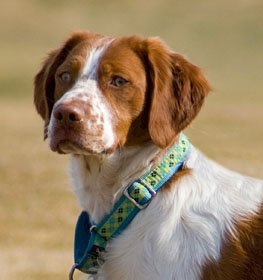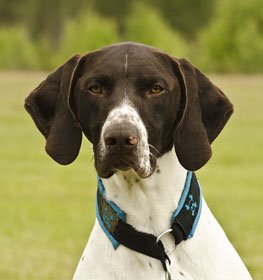Brittany Information & Dog Breed Facts
Collection of all the general dog breed info about Brittany so you can get to know the breed more.
| Group | Gun Dog |
|---|---|
| Popularity Rank | 26 |
| Reviews | 3 |
| User Ratings | |
|
Compare the Brittany With Other Dogs
Select at least one dog breed to make the comparsion. | |
 | |
| Origin | |
|
Common Names & Aliases
What other names is a Brittany known by? Discover all traditional, regional and informal names used for this breed. | American BrittanyBrittany SpanielEpagneul Breton |
|---|---|
|
Breed Classification
What type of dog breed is a Brittany? Learn about its genetic classification and breeding category. | Purebred |
|
Size Classification
What size category is a Brittany? Learn how big the Brittany breed typically grows. | Medium |
|---|---|
|
Weight Statistics
How much does a Brittany weigh? Discover typical weight ranges for adult males and females of the Brittany breed. | Male: 35-40 pounds (16-18 kg), Females: 30-40 pounds (14-18 kg) |
|
Average Weight
What is the average weight of a Brittany? | Male: 37.5 pounds (17 kg), Females: 35 pounds (16 kg) |
|
Height
How tall is the Brittany? Brittany height: | Male: 17-21 inches (43-53 cm), Female: 18-20 inches (46-51 cm) |
|
Average Height
What is the average height of a Brittany? | Male: 19 inches (48 cm), Female: 19 inches (48.5 cm) |
|
Price Range
How much does a Brittany puppy cost? Find current market prices and factors affecting Brittany costs. | $700-$800 If you choose to purchase the Brittany, you should know that the mentioned amount of money is an average of the collected data from breeders’ sites and puppy finder places. If you have a Brittany for sale, please advertise it on a reliable website to make sure the Brittany gets to a happy place. |
|---|---|
|
Availability
How easy is it to get a Brittany? How many Brittany are there in the world? | Very frequent: The Brittany is quite easy to get. There is a risk of overbreeding, as it is an extremely popular breed. Inbreeding is common because of its popularity. A new study suggests that inbreeding contributes to the incidence of disease and health problems. So be careful, buy from a trustworthy place or kennel and seek the help of an experienced person, a professional, to make the right decision. |
|
Intelligence Rating
How intelligent is a Brittany? Discover the Brittany's intelligence ranking and learning capabilities. | Very smart: Brittany is an excellent dog breed. You can teach them many tricks and commands. The limit is your creativity. They understand and memorize new commands in 5-15 repetitions. This breed obeys the first command 85% of the time or better.
The Brittany is one of the top breeds in the dog intelligence ranking. |
|---|---|
|
Training Difficulty
How easy is it to train a Brittany? Learn about the Brittany's trainability and response to training methods. | Brittany dogs are easy to train. They find out the association between commands and actions quite quickly. |
|
Watchdog Rating
How good is a Brittany as a watchdog? Learn about the Brittany's alertness and guarding instincts. | Brittany dogs are average watchdogs. If they sense something different, they will alert you, but observation isn't considered their main job.
|
|
Territorial Protection
Is a Brittany protective of its territory? Learn about the Brittany's guarding instincts and behavior. | Brittany dogs are average defenders. Some dogs are very protective of their territory, while others easily let a stranger to trespass. This breed is not sure to defend its territory in every situation. |
|
Personality Traits
What personality does a Brittany have? Learn about characteristic Brittany temperament and behavior traits. | IndependentAlertIntelligentResponsiveSocial |
|---|---|
|
Sensitivity Level
How sensitive are they? Brittany sensitivity: | Sensitive: Brittany dogs don't like an irregular daily routine, noisy household, and frequent guest visits.
This breed's emotional level reflects their owner's feelings and they don't handle punishments well. |
|
Affection Level
How affectionate are they? Is a Brittany a good family dog? | High: Brittany dogs are genuinely loyal, soft and gentle, loving, and affectionate dogs toward their handlers. They enjoy quality time with their owners despite the activity and are considered great therapy dogs for those in need. This breed responds strongly to their handler's emotions because they bond closely. Their happiness is your happiness. |
|
Social Needs
How much social interaction does the American Brittany need? Brittany social needs: | Brittany dogs need a lot of social interaction. They desire to always be with someone or around people. This breed hates being left alone. |
|
Impulse to Wander or Roam
How likely is the Brittany to run away? Does this breed explore or wander a lot? Does Brittany roam? | The wanderlust potential of the Brittany is strong enough to escape from home. They have a strong desire for exploring the world. Safer to walk them on a leash unless you teach them how to get back to you on command. |
|
Prey Drive
Do this canine have a strong prey drive? Does Brittany have high prey drive? | Brittany dogs have a high impulse to chase and catch something. Cats or any other small animals are in danger. It's a natural instinct, doesn't necessarily mean that Brittany dogs are aggressive. Better to keep this breed on a leash. |
|
Barking Frequency
Does a Brittany bark a lot? Learn about typical Brittany vocalization patterns and triggers. | Average: The Brittany barks occasionally. They can change their barks depending on their emotional level and what they're trying to say. Different barks could mean the same and the same barks could have different meanings.
Top reasons for barking: protection, alarm, fear, boredom, attention-seeking, greeting, separation anxiety, compulsive barking. |
|---|---|
|
Playful Nature
How playful is a Brittany? Understand the typical play drive and energy level of the Brittany breed. | The Brittany is a highly playful breed. Excited barking and sometimes nipping will alert you to play. |
|
Apartment Adaptability
Can a Brittany live in an apartment? Learn about the Brittany's suitability for apartment living. | It is not the best choice if you want to keep them indoors, however, with careful exercise and several walks a day, they will tolerate the indoor environment, so it is possible to keep Brittany indoors. |
|
Lifestyle Adaptability
How adaptable is a Brittany to lifestyle changes? Learn about the Brittany's flexibility to new situations. | Brittany dogs adapt very well to lifestyle changes and basically all living environments. They don't mind moving from one place to another with their owner. |
|---|---|
|
Alone Time Tolerance
Can a Brittany be left alone? Learn about the Brittany's tolerance to solitude. | Brittany dogs tend to have separation anxiety when their owners left them alone at home because they bond very closely with them. |
|
Bite Risk Assessment
What is a Brittany biting potential? Learn about the Brittany's bite risk factors. | Low 🔽 The Brittany has a low chance of biting somebody. Top reasons for dog bite: protection, pain, excitement, herding instinct, being provoked. (Data based on the available online bite statistics.) |
|---|---|
|
Mouthing Tendency
Is a Brittany mouthy? Learn about the Brittany's tendency to use mouth during play. | Brittany dogs have an average tendency to nip, chew, playbite, or herd people. It's a common habit during puppyhood, not aggressive behavior. These "bites" don't hurt, but Brittany dogs need to be taught a good attitude. |
|
Bite Strength Rating
How strong is a Brittany bite? Learn about the Brittany's bite force measured in PSI. | Between 200 and 400 PSI ⏺ Brittany bite force: Ordinary. Bite force Brittany measurements typically fall within the range of 200 to 400 PSI. The bite force of a Brittany is considered ordinary when compared to other dog breeds, but it is still quite powerful. This Brittany bite force PSI can cause bite wounds. Brittany bite PSI is not something that should be feared if the dog is well-trained and managed. To avoid any issues, it's essential to learn how to train a Brittany puppy not to bite from an early age.
The Brittany, and many others, have a fearsome presence because they have significant jaw strength, so it is important not to anger the dog and have it around strangers until it is fully trained. However, they are usually quite calm and good companions, they work well in families and are easy to care for. In conclusion, while the Brittany bite force is certainly an interesting aspect of the breed, it is important not to let it overshadow the many other reasons why these dogs are so loved and respected. With proper training and socialization, a Brittany can be a loyal and protective companion for your family. |
|
Average Lifespan
How long does a Brittany live? Learn about the typical lifespan of the Brittany breed. | 11-15 years The average lifespan of Brittany: 13 years |
|---|---|
|
Climate Tolerance
How well does a Brittany handle different weather? Learn about the Brittany's climate adaptability. | Prefers average to cold weather conditions The Brittany can adapt to well to cold weather conditions, some dogs even can be a good mountain dog. |
|
Health Concerns
What health issues are common in a Brittany? Discover typical conditions affecting the Brittany breed. | The Brittany is a healthy breed, but there are certain health issues that you should check with your vet regularly. |
|
Vet Care Frequency
How often does a Brittany need vet visits? Learn about the Brittany's veterinary care requirements. | Average The Brittany should have a complete physical check-up at least once per year. If your dog shows any symptoms, call your veterinarian. |
|
Health Problems
What genetic/health problems does the Brittany breed have? What are the health issues and concerns of the Brittany breed? Most common health risks of Brittany: | Hip Dysplasia HypothyroidismEpilepsy |
|
Energy Rating
How energetic is a Brittany? Understand daily activity needs of the Brittany breed. | Brittany dogs are high-energy dogs. An active lifestyle makes them happy. |
|---|---|
|
Activity Requirement / Exercise Need
How much exercise does a Brittany need? How much exercise do Brittany dogs require per day?
Do Brittany dogs need a lot of exercises? | Brittany dogs need a lot of exercises. Long walks should be on a daily schedule. If you live an active life, this breed can be a good choice for you. |
|
Sleeping Need
How much sleep does the Brittany breed need? | Brittany dogs don't need too much sleep. They are energetic and desire to live active life. If you think naps are overrated, this breed can be the best choice for you. |
|
Obesity Tendency
Is a Brittany prone to weight gain? Learn about the Brittany's obesity risks. | Average: The Brittany has an average risk for obesity. Daily walks should be on schedule. To make your dog happy and fit, feed him with quality dry dog food and live an active life together. Try to find the happy medium between exercise and feeding.
If you notice any weight gain, consult your veterinarian and make a diet plan. Reduce unhealthy food and snacks, and measure the Brittany weight regularly. |
|---|---|
|
Food Consumption
How much food does a Brittany need daily? Learn about the Brittany's feeding requirements. | 1.5 to 2 cups of high-quality dry food a day, divided into two or three meals. |
|
Allergy Friendliness
Is a Brittany hypoallergenic? Learn about the Brittany's suitability for allergy sufferers. | No Brittany dogs don't do well with allergy sufferers by causing allergic reactions. Some dog breeds are even considered to higher possibility of an allergic response. Coat type isn't necessarily relevant, because most people are allergic to dander (flakes on the dog's skin) or saliva, not actually to dog hair. |
|---|---|
|
Coat Colors
What colors does a Brittany come in? Discover all possible Brittany color variations. | White OrangeLiverRoan |
|
Grooming Requirements
How much grooming does a Brittany need? Learn about Brittany coat maintenance requirements. | Easy to groom: The Brittany doesn't require a lot of grooming. Seasonal flea treatment is needed, but cutting the dog's hair by a professional groomer isn't necessary. Ears and eyes should be cleaned regularly to avoid infections. Brittany is a good choice if you don't have the time, skill, or money to take care of a high-maintenance dog. Recommended for beginners. |
|
Drooling Tendency
Does a Brittany drool a lot? Learn about the Brittany's drooling habits. | The Brittany is a perfect example of a low drooling tendency. If you dislike being covered by slobber spots on your clothes, the Brittany could be a good choice for you. Drooling is the unintentional saliva flowing outside of the mouth. It can be completely normal or a sign of a health problem. Certain dog breeds drool less than others, just like the Brittany.
If you notice any change in your dog's drooling habit, you should contact a vet as soon as possible. |
|
Stinkiness Rating
Does a Brittany smell bad? Learn about the Brittany's natural odor levels. | Medium ⏺ The Brittany has an average chance of bad smell. Top reasons for dog stinkiness: infection of bad tooth/ear/skin folds, gas attacks. |
|
Coat Characteristics
What type of coat does a Brittany have? Learn about the Brittany's fur characteristics. | Feathered |
|
Bathing Needs
How often does a Brittany need baths? Learn about the Brittany's bathing requirements. | 6-8 weeks Rarely. Bathing your dog is beneficial to them in more ways than just one. It’s also a good time to look for unusual scratches, bumps, fleas, and other irregularities. When their hair is wet and flat against their body, these details are more visible.
For example, short-haired dog breeds can go a very long time in between baths. These short-haired breeds shed regularly and that shedding works to naturally remove excess dirt and oil. So unless your weenie dog got into the garbage can, you can probably hold off on a bath for a while. |
|
Shedding Level
How much do Brittany dogs shed? How to control, reduce and prevent the shedding of the American Brittany? Do Brittany dogs shed a lot? | Brittany dogs are low shedders. It's a natural process of the hair growth cycle. The amount and frequency of hair loss mostly depend on their health status and breed type. |
|
Child Compatibility
Is a Brittany good with children? Learn about the Brittany's behavior around kids of different ages. | Brittany dogs are very kid-friendly dogs. This breed enjoys being surrounded by children.
|
|---|---|
|
Pet Compatibility
How well does a Brittany get along with other pets? Discover the Brittany's compatibility with other animals. | Brittany dogs are generally with other pets. |
|
Stranger Friendly
Are they aggressive or friendly towards/with strangers? Brittany temperament with other people: | Brittany dogs are average friendly towards strangers. |
|
Cat Friendly
How well do Brittany dogs get along with cats? Are they good with kittens? What is this fido's temperament with cats? Can they be good with cats? Can the Brittany breed live with a cat? | Brittany dogs are average friendly towards cats. |
|
Dog Friendly
Is Brittany good with other dogs? Are they dog-friendly dogs? How well do Brittany dogs get along with other dogs? | Brittany dogs are very dog-friendly dogs. If you want more dogs in your family or you'd like to join dog meetups, the Brittany can be a great choice. |
|
Good For First Time Owners
Is Brittany breed good for first-time owners? Do they make a good dog for novice owners? Is Brittany breed suitable for first-time owners? | Yes Brittany dogs are good for novice owners, due to their easy-going personality. |
|
Office Friendly
Are Brittany dogs good office canines? Do Brittany dogs make good office-friendly pets? Can they be office dogs? | No Brittany is not the best dog breed for office environment. |
|
Senior Citizens Friendly
Are they senior citizens friendly dogs? How well do Brittany dogs get along with the elderly people? What is the American Brittany temperament with senior people? Are Brittany dogs good for elderly owners? | Brittanys are one of the best breeds for elderly people. |
|
Service Dog Capability
Can a Brittany be a service dog? Learn about the Brittany's service work potential. | Not really This breed generally not used as a service dog. A service dog is a term used in the USA to refer to any type of assistance dog specifically trained to help people who have disabilities, such as visual impairment, hearing impairments, mental disorders, seizures, mobility impairment, and diabetes. Service dogs are protected under the ADA (Americans with Disabilities Act).
Brittany is not the best breed for service purposes. |
|---|---|
|
Therapy Work Suitability
Is a Brittany good as a therapy dog? Learn about the Brittany's therapy work aptitude. | Not really This breed is generally not used as a therapy dog. A therapy dog is a dog that might be trained to provide affection, comfort, and love to people in hospitals, retirement homes, nursing homes, schools, hospices, disaster areas, and people with anxiety disorders or autism.
Brittany is not the best breed for therapeutic purposes. |
|
Scent Detection Ability
Is a Brittany good at detection work? Learn about the Brittany's scenting abilities. | Not really They are not typically employed for this type of work, but there may be exceptional cases. A detection dog or sniffer dog is a dog that is trained to use its senses (mostly its smell) to detect substances such as explosives, illegal drugs, wildlife scat, currency, blood, and contraband electronics such as illicit mobile phones.
Brittany is not the best breed for detection purposes. |
|
Search & Rescue Potential
Can a Brittany do search and rescue? Learn about the Brittany's SAR capabilities. | Not really This dog breed is not typically used as a search and rescue dog. The use of dogs in search and rescue (SAR) is a valuable component in wilderness tracking, natural disasters, mass casualty events, and locating missing people.
The Brittany is not the best breed for SAR purposes. |
|
Maritime Work Ability
Is a Brittany good on boats? Learn about the Brittany's maritime capabilities. | Not really Brittany breed usually doesn't like being on a boat. Boat dogs were typically bred for their strength, stamina, and water resistance, as they were often required to perform tasks such as pulling in fishing nets, and jumping into the water to retrieve ropes or lines, or helping to move cargo. Sailor dog is a type of dog that was bred to accompany sailors on their voyages. They were typically used for three purposes: as a working dog, a watchdog, and as a companion. A boat dog is a term used to describe a type of dog that was traditionally bred and used as a working dog on boats. |
|
Draft Work Capability
Can a Brittany pull carts? Learn about the Brittany's drafting abilities. | Not really A drafting dog or draft dog is a dog bred and used for cart pulling. Dogs bred for this work have strong builds and qualities that are needed, strength and determination.
Brittany is not the best breed for drafting purposes. |
|
Military Service Background
Was a Brittany used in military service? Learn about the Brittany's military history. | Not really In history, this breed was not really used for combat dog. |
|
Puppy Litter Size
How many puppies does a Brittany usually have? Learn about typical litter sizes. | 1-11 puppies, average 6 |
|---|---|
|
Pregnancy Duration
How long is a Brittany pregnant? Learn about the Brittany's gestation period. | 60-64 days Reproductive cycle of the female Brittany: The first period called Proestrus lasts for about 9 days.
During this time the females start to attract males. You can notice by swelling vulva and bloody discharge. The second part is the Estrus when the female is receptive for the male. It lasts for about 3 to 11 days. The sign of the proestrus part is the soft and enlarged vulva. The discharge decreases and lightens in color. The third part is the Diestrus. Normally, it occurs around day 14. In this period the female’s discharge changes for vivid red and coming to its end. The vulva returns to average, and she will no longer permit mating. The fourth part called the Anestrus. The time frame between heat periods normally lasts about six months. |
|
Breeding Frequency
How often can a Brittany have puppies? Learn about safe breeding intervals. | Once a year. More frequent breeding is not healthy. It is very important not to buy a dog from a puppy mill, where the needs of the pups and their mothers are ignored. It's an inhumane high-volume dog breeding facility, where puppies born several times a year. |
|
AKC Classification
What AKC group is a Brittany in? Learn about the Brittany's AKC classification. | Recognized by the American Kennel Club in 1934 as a Sporting breed. |
|---|---|
|
FCI Classification
What FCI group is a Brittany in? Learn about the Brittany's international classification. | Recognized by FCI in the Pointing Dogs group, in the Continental Pointing Dogs section. |
|
Kennel Club Recognition
Which kennel clubs recognize a Brittany? Learn about the Brittany's official recognition. | American Canine RegistryAmerican Kennel ClubAmerica's Pet RegistryCanadian Kennel ClubDog Registry of America Inc.Federation Cynologique InternationaleKennel Club of Great BritainNorth American Purebred Registry, Inc.American Canine Association, Inc.Australian National Kennel CouncilContinental Kennel ClubNational Kennel ClubNew Zealand Kennel ClubUnited Kennel Club |
Brittany Pros and Cons
- Intelligence Rating: Very smart: Brittany is an excellent dog breed.
- Training Difficulty: Brittany dogs are easy to train.
- Grooming Requirements: Easy to groom: The Brittany doesn't require a lot of grooming.
- Shedding Level: Brittany dogs are low shedders.
- Drooling Tendency: The Brittany is a perfect example of a low drooling tendency.
- Lifestyle Adaptability: Brittany dogs adapt very well to lifestyle changes and basically all living environments.
- Child Compatibility: Brittany dogs are very kid-friendly dogs.
- Dog Friendly: Brittany dogs are very dog-friendly dogs.
- Senior Citizens Friendly: Brittanys are one of the best breeds for elderly people.
- Good For First Time Owners: Brittany dogs are good for novice owners, due to their easy-going personality.
- Allergy Friendliness: Brittany dogs don't do well with allergy sufferers by causing allergic reactions.
- Impulse to Wander or Roam: The wanderlust potential of the Brittany is strong enough to escape from home.
- Alone Time Tolerance: Brittany dogs tend to have separation anxiety when their owners left them alone at home because they bond very closely with them.
- Office Friendly: Brittany is not the best dog breed for office environment.
Brittany History
The Brittany or as many call them, the Brittany Spaniel’s origins can be traced back to the 17th century. The breed took their name from the Celtic area of northwest France, which was one independent kingdom. Brittany can be found across the English Channel from Wales, and for over a thousand years, there was a great deal of commerce and trade between the two countries. Usually, dogs were a part of the trade.
The first records of Brittany-type dogs are from the 17th century, back then, similar-looking white-and-liver colored dogs were depicted in works of art and kinds of literature, during pointing games for hunters. The Brittany certainly evolved over the following centuries, many researchers and historians believe that many English and Welsh breeds, probably the Welsh Springer Spaniel had a significant impact on the breed’s development during the early 1800s. The modern version of the breed started to take shape in the middle of the 19th century, in a small town in Brittany called Pontou. It was believed that the dogs were a result of a cross between a lemon and white male brought to Brittany for shooting by an English sportsman and a white and mahogany female owned by a French hunter. The result was a bob-tailed dog that pointed and retrieved really effectively. Local poachers really appreciated and were fond of the breed, for the reason that the dogs had agility, speed, and the willingness to take direction.
Around the 19th century, dog shows became really popular all around Europe, including France. Brittanies were moved easily from the hunting fields to the show rings, thanks to their stunning looks and overall appearance. The breed quickly became recognized, because of these shows in France. The first Brittany to be registered in the country was an orange-white male specimen called Boy, in 1907. Despite their popularity in their indigenous land, the breed did not get to the United States of America until 1931. Nevertheless, once the breed became known, it gained massive popularity. The first Brittany got registered by the AKC (American Kennel Club) in 1934, the specimen was called Edir du Mesnil. Later, in 1942 the American Brittany Club was formed and re-wrote the breed standard set up by the French, to better suit themselves. Resembling many breeds’ histories, the Second World War caused the Brittany population to suffer a serious decrease. This was partly because, in France, Brittany's breeding came to a halt during the war. However, fortunately, after the war, French breeders have decided collectively to allow black-spotted dogs in the standards because the gene pool was so depleted throughout Europe. Interestingly, the authorities in the United States of America and in Canada did not follow this, even today the black coloring is not an accepted color for Brittanies in the U.S. and in Canada, but it is accepted in other parts of the world.
For many years, most of the breeders wanted to delete the “spaniel” word from Brittany’s name, simply for the reason that the breed is a pointing breed, not flushing while hunting, like the spaniels. The AKC Board of Directors approved the name changing the name to Brittany, in April of 1982. In some countries, however, the breed is still called, even today, a Brittany Spaniel. Nowadays, the breed is mostly kept as an energetic, intelligent, people-centered, and biddable family companion. Yet, many French hunters are still gladly using the Brittany while hunting.
Latest Brittany Compares
Brittany Names
How old is my Brittany in human years?
You May Also Like
Rate The Brittany Breed
Brittany Comments, Reviews and Questions
- Layla
May 29, 2022, 4:03:14 PM:
Smart and very loyal. She’s a smuggler.
- Fati
Apr 10, 2021, 6:10:46 PM:
They are the best cuddle buddies that ever existed
- Hullo
Nov 20, 2019, 10:39:25 PM:
Hi




